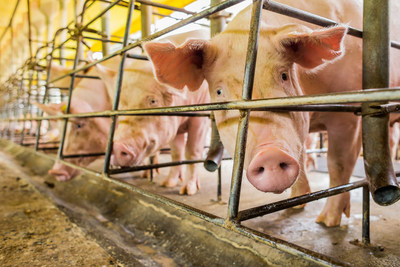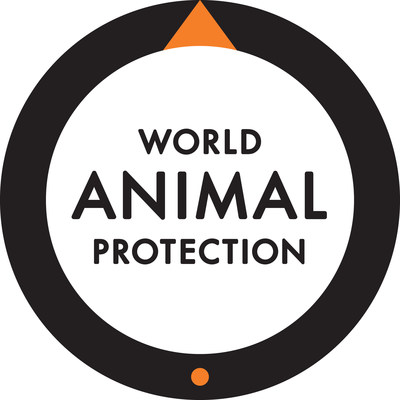World Animal Protection research finds superbugs in pork products from Carrefour in Spain and Walmart in Brazil
NEW YORK, Dec. 13, 2018 /PRNewswire/ -- Bacteria resistant to antibiotics most critically important to humans has been found in pork from supermarket shelves in Brazil, Spain and Thailand. This is a symptom of the routine overuse of antibiotics propping up low-welfare practices in pig farming and contributing to the superbug crisis, says World Animal Protection.

The organization tested pork from the shelves of supermarkets in Australia, Brazil, Spain and Thailand, finding 'superbugs' resistant to antibiotics of highest critical importance to humans in three of the four countries, including in samples from Carrefour in Spain and Walmart in Brazil.
The results shockingly highlight how the overuse of antibiotics in factory farming has become a band-aid solution to prevent cramped and stressed animals from getting sick, while also contributing to the superbug crisis.
The findings support existing evidence that routine overuse of antibiotics in farm animals is a significant contributor to the rise of superbugs, as recognized by the World Health Organisation (WHO) and the UN. Superbugs in the food chain can cause food poisoning, blood poisoning, urinary tract infections, and in some cases, even death.
Three quarters of the world's antibiotics are used in farming annually, with the highest use in pigs. Routine overuse is often associated with low-welfare practices.
Some of the cruel practices typically associated with low-welfare farms, which are leading to lifelong suffering and overuse of antibiotics on pig farms, include:
- Piglets are taken from their mothers far too early and mother pigs are used as breeding machines, kept in steel cages no bigger than a fridge, unable to turn around and enduring unnecessary stress
- Piglets are cruelly mutilated often with no pain relief: their tails are cut, their teeth are ground or clipped, their ears notched, and most male piglets are castrated
- Pigs are cramped in dark, squalid warehouses, forced to lie in their own waste. These are stressful conditions that provide the perfect breeding ground for the spread of infection, leading to routine overuse of antibiotics.
World Animal Protection is calling for global supermarkets to urgently improve the lives of pigs by only sourcing pork from high-welfare farms.
Jacqueline Mills, Head of Farming at World Animal Protection, said: "We tested pork products to see for ourselves how the pig industry contributes to superbugs, and to provide evidence to supermarkets to urge them to take responsibility and help to raise pigs right."
"Factory farm conditions for pigs cause them immense pain and stress, which involves a steady overuse of antibiotics. But there is a better way. Supermarkets must demand their suppliers improve the welfare of pigs. Higher-welfare systems allow for responsible antibiotic use, as has been proven in Sweden."
"We need to see an end to close confinement and barren environments, so pigs can live in social groups in comfortable environments with opportunities to express natural behavior. Supermarkets should be setting the bar far higher to ensure the animals in their supply chains are less stressed, and antibiotics are used responsibly in farming."
World Animal Protection is working with producers to develop higher-welfare systems, to get pigs out of cages and into social groups with manipulable materials to allow for expression of natural behavior.
Join World Animal Protection and demand your supermarket makes a commitment to only sell pork from pigs that have been raised right.
To read World Animal Protection's report "Pork and the Superbug Crisis," visit https://www.worldanimalprotection.us/sites/default/files/us_files/pigs_and_the_superbug_crisis.pdf
Notes to Editors
- For media interviews, images or video clips, please contact: Heather Hunter, [email protected], +1-646-783-2203
- Superbugs are antibiotic-resistant bacteria and have been called one of the biggest threats to global health and development. The overuse of antibiotics has led to the spread of superbugs, and could affect millions of people around the world, especially in developing countries. 700,000 people worldwide die each year from antibiotic-resistant infections, and this is projected to rise to 10 million deaths annually by 2050.
- A series of international research studies conducted for World Animal Protection found that eight out of ten consumers (80%) in Brazil, Thailand and Australia are concerned about the human health impact of routine overuse of antibiotics in farm animals.
- Since the launch of World Animal Protection's Raise Pigs Right campaign in 2018, the largest supermarket chain in the U.S., Kroger, has committed to ending the confinement of pregnant pigs by 2025. In Thailand, Tops Market and Central Food Hall have committed to ending confinement of pregnant pigs by 2027.
- Sweden became the first country to ban antibiotics to promote growth in 1986, introducing a veterinary prescription requirement for antibiotic use to prevent or treat disease. As of 2015, there has been a 65% decrease in antibiotic use in pigs from pre-ban levels. They improved welfare: giving piglets more time with their mothers prior to weaning so they are more robust, and giving animals more room to move, to allow for reduction in routine antibiotic overuse. The government also incentivized the move to higher welfare, paying a subsidy to pig producers with welfare practices above the legal minimum. In Sweden, pigs are not allowed to be confined in cages and it is not permitted to cut tails. Bedding is required.
- As of June 2018, private equity firm Advent International took an 80% stake in Walmart Brazil with Walmart Inc. retaining a 20% stake.
ABOUT WORLD ANIMAL PROTECTION
World Animal Protection (formerly known as the World Society for the Protection of Animals) has moved the world to protect animals for the last 50 years. World Animal Protection works to give animals a better life. Its activities include working with companies to ensure high standards of welfare for the animals in their care, working with governments and other stakeholders to prevent wild animals being cruelly traded, trapped or killed, and saving the lives of animals and the livelihoods of the people who depend on them in disaster situations.
World Animal Protection influences decision makers to put animals on the global agenda, and it inspires people to protect animals and to change animals' lives for the better. More information on World Animal Protection can be found at: www.worldanimalprotection.us

SOURCE World Animal Protection
News published on and distributed by:



